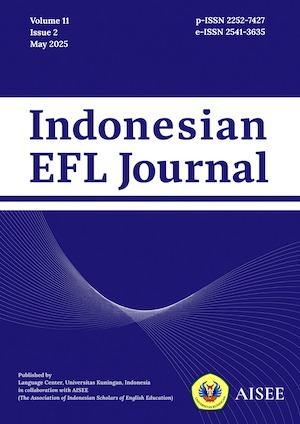DEVELOPING MOOC-BASED VIDEO CONTENT FOR CREATING SUPPORTIVE LEARNING ENVIRONMENTS IN SPEAKING COURSES FOR EFL LEARNERS
Abstract
MOOC (Massive Open Online Courses) represents a pivotal point in language learning, as this platform can facilitate various forms of learning materials such as handouts, instructional videos, and online assignments. In this study, the authors focus on developing MOOC for the course Speaking for Academic Purposes, providing engaging and easily understandable materials for its users. The research was conducted by applying the research and development design known as the R & D cycle. It was adapted and simplified into five stages: research and information collection, product development, expert validation, field testing, and final product. Having conducted the research, the writers consider that the developed MOOC-based video content product is feasible for English Department students. Based on the expert validation, the product obtained a 95.8% feasibility score, while in the field research, the product achieved an 89.9% feasibility score. The final product serves as valuable speaking materials for both teachers and students, underscoring the study's significance in enhancing language education through innovative online learning tools.
References
Aydın, M., & Karal, H. (2023). Investigation of instructors’ massive open online course experiences: Actions and outputs. *E-Learning and Digital Media, 21*(4), 329-345. https://doi.org/10.1177/20427530231156174
Bonafini, F., Chae, C., Park, E., & Jablokow, K. (2017). How much does student engagement with videos and forums in a mooc affect their achievement? *Online Learning, 21*(4). https://doi.org/10.24059/olj.v21i4.1270
Borg, W., & Gall, M. (1989). Educational research: An introduction. Longman.
Bulfin, S., Pangrazio, L., & Selwyn, N. (2014). Making ‘moocs’: The construction of a new digital higher education within news media discourse. *The International Review of Research in Open and Distributed Learning, 15*(5). https://doi.org/10.19173/irrodl.v15i5.1856
Dillahunt, T., Wang, Z., & Teasley, S. (2014). Democratizing higher education: Exploring mooc use among those who cannot afford a formal education. *The International Review of Research in Open and Distributed Learning, 15*(5). https://doi.org/10.19173/irrodl.v15i5.1841
Haron, H., Yusof, A., Samad, H., Ismail, N., Juanita, A., & Yusof, H. (2019). The platform of mooc (massive open online course) on open learning: Issues and challenges. *International Journal of Modern Education, 1*(3), 01-09. https://doi.org/10.35631/ijmoe.13001
Ismail, W., Shahid, N., Abdullah, A., Noor, M., Ibrahim, T., Zainuddin, N., et al. (2022). Evaluation of massive open online course (mooc) approach among undergraduate students. *International Journal of Academic Research in Progressive Education and Development, 11*(4). https://doi.org/10.6007/ijarped/v11-i4/15887
Kim, S. (2016). Moocs in higher education. Retrieved from https://doi.org/10.5772/66137
Malykhina, T., Zolotykhin, S., Larina, L., Кузьміна, А., & Pravednikova, T. (2019). Development and implementation of blended courses for Russian language teachers in Russia and abroad. *SHS Web of Conferences, 69*, 00142. https://doi.org/10.1051/shsconf/20196900142
Martín-Valero, R., Pastora-Bernal, J., Ortiz-Ortigosa, L., Casuso-Holgado, M., Perez-Cabezas, V., & Ruiz-Párraga, G. (2021). The usefulness of a massive open online course about postural and technological adaptations to enhance academic performance and empathy in health sciences undergraduates. *International Journal of Environmental Research and Public Health, 18*(20), 10672. https://doi.org/10.3390/ijerph182010672
Nordin, N., & Norman, H. (2018). Cross-culture learning in massive open online courses for higher education (pembelajaran merentas budaya melalui massive open online courses untuk pendidikan tinggi). *Jurnal Pendidikan Malaysia, 43*(01). https://doi.org/10.17576/jpen-2018-43.01-05
Perguna, L., Idris, I., & Irawan, I. (2020). From content to context: Understanding introduction to sociology through mooc. *International Journal of Emerging Technologies in Learning (Ijet), 15*(07), 188. https://doi.org/10.3991/ijet.v15i07.13467
Pham, A., Pham, T., Huynh, G., Vo, T., Nguyen, A., & Tran, T. (2021). Factors affecting students’ intention to use massive open online courses. *Vietnam Journal of Education, 5*(3), 63-71. https://doi.org/10.52296/vje.2021.117
Pireddu, R., Truyen, F., Taes, S., & Bocyte, R. (2022). Indices: A mooc on developing digital transition strategies for cultural heritage institutions. *European Conference on E-Learning, 21*(1), 425-431. https://doi.org/10.34190/ecel.21.1.904
Rasheed, R., Kamsin, A., Abdullah, N., Zakari, A., & Haruna, K. (2019). A systematic mapping study of the empirical mooc literature. *Ieee Access, 7*, 124809-124827. https://doi.org/10.1109/access.2019.2938561
Sugiyono. (2016). Metode penelitian kuantitatif, kualitatif, dan R&D. Penerbit Alfabeta
Sulistyo, G.H. (2011). Reading for meaning: Theories teaching strategies and assessment. Pustaka Kaiswaran.
Stöhr, C., Stathakarou, N., Mueller, F., Nifakos, S., & McGrath, C. (2018). Videos as learning objects in moocs: A study of specialist and non‐specialist participants' video activity in moocs. *British Journal of Educational Technology, 50*(1), 166-176. https://doi.org/10.1111/bjet.12623
Windrati, N., Fiani, I., Bintarti, A., & Asih, I. (2023). Pengembangan rancangan pembelajaran massive open and online courses (moocs) public speaking. *Jurnal Pendidikan Terbuka Dan Jarak Jauh, 24*(1), 9-18. https://doi.org/10.33830/ptjj.v24i1.3987.2023
Yadav, K., Shrivastava, K., & Deshmukh, O. (2014). Towards supporting non-linear navigation in educational videos. Retrieved from https://doi.org/10.1145/2663204.2669630
Yunus, M., Hashim, H., & Hashim, H. (2019). Massive open online courses: En route to communication skills acquisition. Retrieved from https://doi.org/10.31235/osf.io/xez9k
Zee, T., Admiraal, W., Paas, F., Saab, N., & Giesbers, B. (2017). Effects of subtitles, complexity, and language proficiency on learning from online education videos. *Journal of Media Psychology Theories Methods and Applications, 29*(1), 18-30. https://doi.org/10.1027/1864-1105/a000208
Ивашкина, Т., Сидоренко, В., & Сухова, Е. (2022). Impact of mooc on increasing student interest in the learning process in the context of blended learning. *Revista Tempos E Espaços Em Educação, 15*(34), e17321. https://doi.org/10.20952/revtee.v15i34.17321









